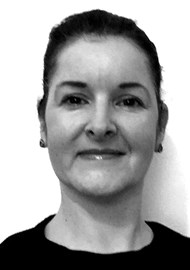The perception and enjoyment of music is central to many people’s lives. Harriet Crook (herself a cochlear implant recipient) tells us about important work in this area for people using hearing aids and CIs.
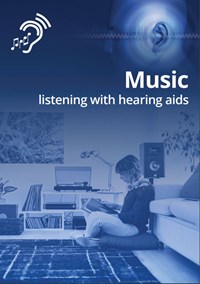
There is now a wealth of published evidence on music listening with cochlear implants [1], and we have all probably read at least one article on music and implantation, but how many of us can say we took something away to our own practice around how we support our patients for music engagement?
A big ask, but as both a cochlear implant clinic co-ordinator and a cochlear implant recipient of three years, I wanted to reflect on whether there is a more urgent need to access music for wellbeing post-pandemic. Recognition of music’s value in health is clearly growing. At the time of publication, PubMed data showed 866 peer-reviewed articles on music and health in 2020, with exponential growth. NICE data showed 252 systematic reviews involving music (2016-2021) and Cochrane Database, 571 trials involving music plus 29 systematic reviews relating to music and health. As things open up post pandemic – could implant services do anything extra to increase our support for music engagement?
“HAFM resources can be useful for cochlear implant clinics too. Getting engaged before implant could help transition to post implant listening”
As a clinican researcher, I’ve also spent the last five years working on the UK’s Hearing Aids for Music (HAFM) project gathering the first large scale data (n=1507) on music listening behaviours with hearing loss – www.musicandhearingaids.org. This project has been insightful, not only for hearing aids, but also for those with cochlear implants.
Working with HAFM, I realised I had also ‘switched off’ from music engagement and, as with many HAFM study participants, the emotional loss of music can be huge, with little space in the cochlear implant assessment pathway to acknowledge the loss of something integral to career, education, social life and emotional wellbeing [2].
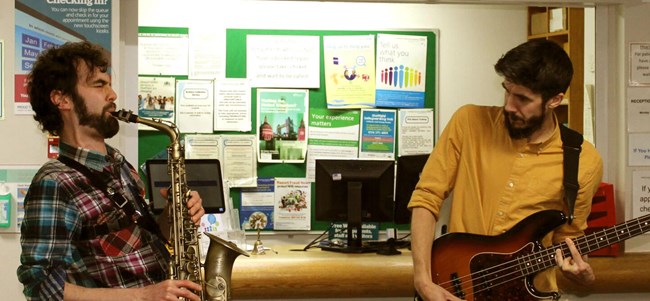
Live (pre-pandemic) performance to showcase the music made by participants.
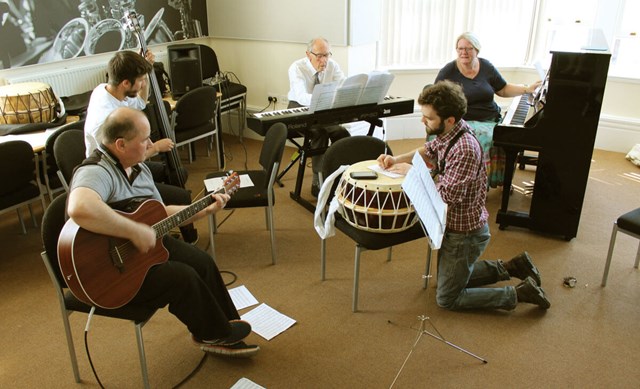
Melvyn Hartle Geoffrey Hayes and Hilary Robinson with Joe and Thomas.
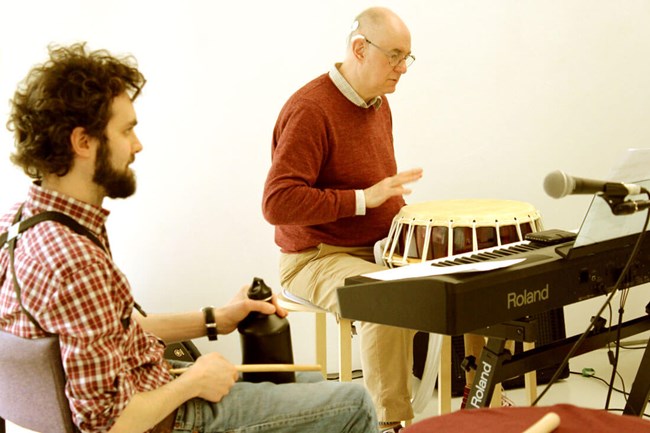
Tom and Peter.
HAFM research captured exactly this type of feedback, and findings suggest people do want conversations about music, with 67% of respondents having some degree of problem with music listening – but 58% never having a conversation about music with their audiologist [3]. It is likely these problems persist with patients’ journeys through to cochlear implant. As candidacy broadens internationally and the older implanted population increases, we should take note (no pun intended) that active music making has proven benefits for older people [4].
“As candidacy broadens internationally and the older implanted population increases we should take note (no pun intended) that active music making has proven benefits for older people”
At the heart of all the research I have undertaken is a commitment to deliver something tangible for my patients and, pleasingly, HAFM findings showed that hearing aid users reported positive changes in music listening practices as a result of just participating in our work [5]. With evidence of local need, in Sheffield, UK (2019) our hospital Arts in Health department obtained funding (Arts Council England) to run a series of free music workshops for those with hearing loss - www.arts.sth.nhs.uk/newsarchive.html. The workshops provided a safe space to explore musical engagement using university premises and facilitated by professional musicians. The participants included cochlear implant recipients and candidates, and the supported environment allowed them to engage again with confidence, to compose and play music.
One implant recipient, Peter Ford, captures exactly how music engagement links to everyday life:
“The first time I heard (music) were Thomas’ saxophone as I wasn’t expecting what’s sound like!
I attend each week I enjoyed very much and learns the kinds of instruments. I played the piano noticed different frequencies from low to high pitch that I can hear with cochlear implant than hearing aids were limited (low to middle pitch) we are playing each other in different instruments and were surprised easily recognise the kinds of instrument were playing.”
After the workshops Peter commented, “I often went to town, I would hear the music far off about 400 yards, I wouldn’t find who’s play and recognise its saxophone until I walk up nearer until I find – two students were playing saxophones, I thought WOW! Easily recognise! Amazing!!- and I brought CD player from my 66th birthday.”
The workshops highlighted that this is very much something feasible to do. A group setting can be cost effective and can provide the individual support needed to get engaged again. My own experience of music has also changed through participating; although discrimination of pitch is poor, the quality of spatial sound and impact that has on music is incredible, and I share the joy that Peter describes in detecting a new instrument not heard before. I can see a future taking part again in music, but this wouldn’t be easily captured by any existing outcome measure (if at all).
This is a gap we often face as clinicians in capturing QoL outcomes, and an informal survey of UK Cochlear Implant programmes (May 2021) revealed there is very little use of outcome measures that include music, identifying a further need. At HAFM we continue to work with this aim of developing accessible materials for listeners and clinicians, applying our research to the widest possible groups.
Creating change – how can clinics support music engagement?
- Don’t create barriers – you don’t have to be an expert on music! Starting conversations can reveal local needs, and grief about loss of music is real - don’t dismiss it.
- HAFM resources can be useful for cochlear implant clinics too. Getting engaged before implant could help transition to post-implant listening.
- Encourage reference to identify if there are specific musical needs for patients.
- Signpost – be aware of resources: from manufacturers, local or national support groups. Could your service produce an online leaflet?
- Local and national organisations can help e.g., Help Musicians (UK):
www.helpmusicians.org.uk/health-welfare/musicians-hearing-health-scheme
Association for Adult Musicians with hearing loss (USA):
www.musicianswithhearingloss.org/wp/ - Could you have an advocate who is a ‘music champion’? Supporting listeners to attend musical events could be invaluable in improving access.
- Don’t go it alone! Could a patient support group run a music session with yours or others’ help?
- Make contact with hospital arts programmes and music therapists. They may be able to provide support you can’t offer directly from your clinic.
Read more at www.musicandhearingaids.org and on Twitter @musicndeafness.
Recordings from music workshops are available at:
https://soundcloud.com/user-751784010/
sets/in-and-out-of-hospital
References
1. Riley PE, Ruhl DS, Camacho M, Tolisano AM. Music Appreciation after Cochlear Implantation in Adult Patients: A Systematic Review. Otolaryngology–Head and Neck Surgery 2018;158(6):1002-10.
2. Lamont A, Greasley AE, Sloboda JA. Choosing to Hear Music: Motivation, Process and Effect. In: Hallam S, Cross I, Thaut M, (Eds.). Oxford Handbook of Music Psychology. 2nd edition. Oxford, UK; Oxford University Press; 2016:711-24.
3. Greasley A, Crook H, Fulford R. Music listening and hearing aids: perspectives from audiologists and their patients. International Journal of Audiology 2020;59(9):694-706.
4. Hallam S, Creech A, Varvarigou M, et al. Does active engagement in community music support the well-being of older people? Arts & Health 2014;6(2):101-16.
5. Greasley AE, Crook H, Beeston AV, Hearing Aids for Music: Findings and recommendations for hearing aid users, audiologists, manufacturers and researchers. Final report of the AHRC-funded Hearing Aids for Music Project. 25 April 2019.


